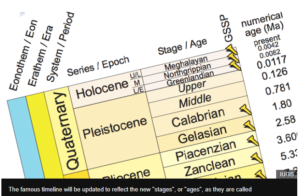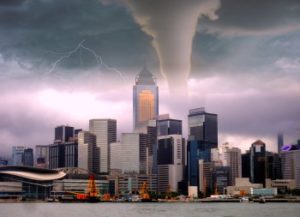by M. Roffet-Salque et al., August 13, 2018
This study reveals that animal fats preserved in pottery vessels from the United Nations Educational, Scientific and Cultural Organization (UNESCO) World Heritage site of Çatalhöyük recorded the abrupt 8.2-thousand years B.P. climatic event in their hydrogen isotopic compositions. In addition, significant changes are observed in the archaeology and faunal assemblage of the site, showing how the early farming community at Çatalhöyük had to adapt to climate change. Significantly, this contribution shows that individual biomolecules preserved in ancient animal fats can be used to reconstruct paleoclimate records and thus, provides a powerful tool for the detection of climatic events at well-dated onsite terrestrial locations (i.e., at the very settlements where human populations lived).
…
by Helmholtz Centre for Ocean Research Kiel (GEOMAR), Auhsut 14, 2018 in ScienceDaily
-
The unusual timing of highly-productive summer plankton blooms off Greenland indicates a connection between increasing amounts of meltwater and nutrients in these coastal waters. Researchers now show that this connection exists, but is much more complex than widely supposed. Whether increasing meltwater has a positive or negative effect on summertime phytoplankton depends on the depth at which a glacier sits in the ocean.
-
…
“So, the study shows that further melting of Greenland’s glaciers only leads to stronger summer plankton blooms under very specific conditions, an effect that will ultimately end with very extensive further melting,” Hopwood summarizes the results of the study.
by Technical University of Munich (TUM), August 14, 2018
Wood density of European trees decreasing continuously since 1870
-
Trees are growing more rapidly due to climate change. This sounds like good news. After all, this means that trees are storing more carbon dioxide from the atmosphere in their wood and hence taking away the key ingredient in global warming. But is it that simple? A team analyzed wood samples from the oldest existing experimental areas spanning a period of 150 years — and reached a surprising conclusion.
…
But the most important finding for practical and political aspects is that the current climate-relevant carbon sequestration of the forests is being overestimated as long as it is calculated with established but outdated wood densities. “The accelerated growth is still resulting in surplus carbon sequestration,” says Pretzsch. “But scaling up for the forests of central Europe, the traditional estimate would be to high by about ten million metric tons of carbon per year.”
by Anthony Watts, August 13, 2018 in WUWT
The global body tasked with naming geological eras, the International Commission on Stratigraphy, has rejected the proposed Anthropocene epoch, the controversial ‘geological’ epoch in which mankind allegedly dominates natural processes. The international commission has now rejected the proposal and has instead split the Holocene Epoch into three different geological ages, all of which were primarily shaped by natural, not human factors.
…

See also here
by Dr. R. Pielke, August 14, 2018 in ClimateChangeDispatch
In his posthumously published book “Factfulness,” the Swedish statistician Hans Rosling describes a paradox: “The image of a dangerous world has never been broadcast more effectively than it is now, while the world has never been less violent and more safe.”
A case in point: natural disasters. The earth will always be volatile, but despite recent fires, volcanoes, and hurricanes, humanity currently is experiencing a stretch of good fortune when it comes to disasters.
It’s difficult to be “factful” about disasters—the vivid trauma of each event distracts observers from the long-term decrease in destructiveness.
But climate activists make the problem worse by blaming every extreme weather event on human-caused climate change, hoping to scare people into elevated concern.
…

by ‘Stop These Things‘, August 14, 2018
Germany’s wind and solar experiment has failed: the so-called ‘Energiewende’ (energy transition) has turned into an insanely costly debacle.
German power prices have rocketed; blackouts and load shedding are the norm; and its idyllic countryside has been turned into an industrial wasteland, with its forests, no exception (see above).
Hundreds of billions of euros have been squandered on subsidies to wind and solar, all in an effort to reduce carbon dioxide gas emissions. However, that objective has failed too: CO2 emissions continue to rise.
La géologie, une science plus que passionnante … et diverse


